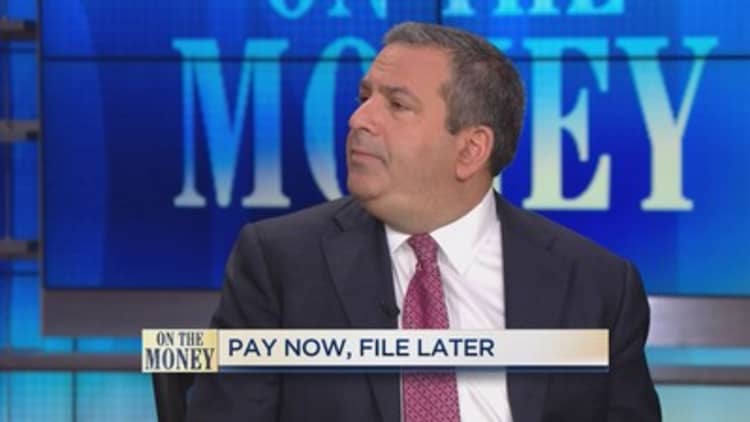
If you've been procrastinating on your taxes until now, here's some 11th hour advice: Keep calm and gather your documents.
As of April 7, the Internal Revenue Service has received more than 103 million individual income tax returns. That's down by 3.6 percent from last year. Overall, the federal agency predicts it will receive more than 153 million returns this season.
If you're still dragging your feet on submitting your Form 1040, you should know that you have until April 18 to file. That's just three days away.
"No, it's not too late to go to an advisor," said Brent Lipschultz, a certified public accountant (CPA) and partner at PricewaterhouseCoopers.
"You can still file a six-month extension," he said. "But if you have a simple return or you're getting a big refund, you should file now."
Get an extension
If you need more time to hunt down additional paperwork, you'll need to file Form 4868 with the IRS.
While an extension will give you more time, you'll still need to pay any taxes owed by April 18. If you work with a CPA or preparer, be sure to ask him or her to file that extension.
These professionals aren't allowed to ask the IRS for more time unless you request it or give them permission, said Cari Weston, director of tax practice and ethics at the American Institute of CPAs.
Track down your documents
A tax organizer, which you can get from your CPA or find online, can help you pull your necessary forms together. "It will prompt you for information so you can diagnose what needs to be on your tax return," said Lipschultz.
Then, create a checklist to make sure you don't forget to report items such as freelance income on 1099s or money from Social Security.
You can also use your completed return from last year as a guide for the paperwork you'll need, the deductions you took and your sources of income.
Don't miss these deductions
If you rush through your return, you're putting yourself at risk for errors that can cost you money.
"Home office deductions are missed a lot," said Lipschultz. "If you have a gig business, like you're an Uber driver, you can deduct some expenses."
Here are some commonly missed deductions.
Student loan interest: You can deduct the lesser of $2,500 or the amount of interest paid during the year, subject to income phaseouts.
Moving expenses: You moved due to a change in your job and your new workplace is at least 50 miles farther away from your old home versus the distance between your old dwelling and your old workplace.
Property taxes: It's not just your primary home that can qualify. Your second home and perhaps even your timeshare may as well.
Noncash charitable contributions: Be sure to include your receipts. You'll need to file Form 8283 if your deduction for all noncash gifts is over $500.
Contributions to certain tax-advantaged accounts: That includes your health savings account and your individual retirement account.
Miscellaneous deductions: You can claim tax preparation fees, un-reimbursed employee expenses and other costs that exceed 2 percent of your adjusted gross income.
Medical deductions: You can deduct qualified medical expenses that exceed 10 percent of your adjusted gross income for that year. Spoiler alert: Most cosmetic surgeries won't fly.
Software versus CPAs
If you're running a small business, have multiple sources of income, or own investments and rental property, you may have a situation that's complex enough to warrant professional help.
"Software isn't always user-friendly, and it may miss deductions," said Lipschultz. "If you have a complicated situation with investments or partnerships, I wouldn't recommend using them."
If you're preparing your own taxes using software, make things a little easier for yourself by using the same program from last year.
"Many software programs will carry your information forward so that you don't have to reenter your basic data," said Weston of the AICPA. Some will also copy over a rival's data.
If you've had any changes since last year — a divorce, a new job or even a new bank account — you'll want to enter that information yourself.
"If you don't change your data, it will delay the processing of your return," Weston said.
"On the Money" airs on CNBC Saturdays at 5:30 a.m. ET, or check listings for air times in local markets.



